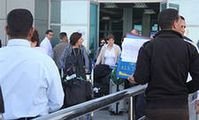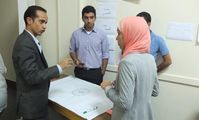A World-Class Infrastructure Base

ITIA NATIONIN which three mobile phone networks cover nearly 100% of the country's inhabited land. Where a waterway carries more than 8% of the world's total shipping every year. Where every home with a phone line has dial-up internet access for the price of a local call and a dozen companies compete to offer broadband connections to homes and offices in major urban centers. Well-maintained highways shift freight and passenger vehicles between cities, towns and resort destinations. Electricity subsidies are ending, but the per-kilowatt hour price remains affordable to consumers and industry alike.
You could be forgiven for thinking we were describing a European economy, but this is Egypt, where investors enjoy not just low labor costs, a trained workforce, proximity to major global markets and a unique basket of preferential trade agreements, but solid infrastructure, too.
Information and Communications Technology (ICT)
Egypt's IT and communications infrastructure is among the best-developed and most competitive in the Middle East and Africa. Today, deregulation, enhanced competition and the export of services are the accepted norms in an ICT sector that is growing at a sustained 25% annually and that has attracted EGP 50 billion in new investment in the past four years.
Recent regulatory measures are accelerating the process: New submarine cables have been licensed to consortiums of national and regional players; new international gateways for voice and data are in the works: a second fixed-line operator with a WiMAX license will be online in 2009. guaranteeing a challenger to current operator Telecom Egypt and introducing commercial WiMAX simultaneously; and the licensing of triple-play sen ices for voice, data and video is in the works.
The nation is served by three advanced mobile telephone networks, all of which are or will soon be 3.5G. Every home with a landline has dial-up internet access for the price of a local phone call. Egypt now has more than 9 million unique internet users, while 500,000 households subscribe to broadband services and 25,000 more join them every month.
At least three major urban centers are testing municipal WiMAX high-speed wireless broadband networks. Private businesses, restaurants and cafes across the country run their own Wi-Fi networks to serve their customers.
The nation's system of postal outlets is being reconfigured as both a business communications network and as a point of contact for the delivery of important government services. Meanwhile, Smart Village — the premiere technology park in the Middle East, which is home to offices of major national and global ICT players and will soon include a new financial-services district— is set to replicate its success in other Egyptian locations. A new call center park will soon break ground in the upscale Cairo suburb of Maadi in a partnership between the ministries of CIT and Investment.
National fixed-line operator Telecom Egypt (ТЕ) now seizes more than 11 million subscribers with a capacity of over 13.8 million lines. Since the turn of the century, ТЕ has ramped up its competitive metabolism and taken strong steps to diversify its revenue stream. It has taken a stake of more than 40% in Vodafone Egypt (one of the nation's three mobile operators) and has spun off subsidiaries that now include the region's most high-profile call center operation, a booming ISP / broadband provider, and joint-venture wireline network in Algeria, to name but a few. Today, the company is working on expansion projects to serve Egypt's growing demand for telecom services, including undersea cables connecting Egypt to the world.
In the mobile communications arena. Mobinil. a subsidiary of" Egypt-based multinational Orascom Telecom in partnership with France Telecom's Orange division, launched in the late 1990s; it was soon followed by what is known today as Vodafone Egypt. The two were joined by Etisalat Misr (a consortium led by Etisalat of the EIAE and including Egypt Post, the National Bank, and the Commercial International Bank) in 2007.
Today, both Etisalat and Vodafone Egypt have launched robust 3.5G networks and Mobinil will soon follow suit. Combined, the three companies have over 32 million subscribers, having added some 10 million new subscribers in the last year and hitting a penetration rate of more than 42.33%.
Incentive packages have attracted multinationals to Egypt, where they are basing call centers, business-process outsourcing, knowledge-process outsourcing and technical-support operations. They have found Egyptian talent up to the challenge and the nation's telecom infrastructure of global standard, all while being based in a working environment that — from cost to logistics — helps them gel business done better, faster and cheaper.
The deregulation of the sector has benefited consumers and investors alike, and strategies to improve regional and international connectivity, roll out broadband technologies, promote convergence services and address cyber-security are adding to what has already been achieved
Electricity
Egypt is one of the MENA region's top exporters of electricity, with some 107.5 billion kilowatt hours being generated in 2005/06. a 240% increase over 1991/92. More than 37.900 kilometers of transmission and distribution wires criss-cross the nation, delivering power to in dustry, commercial and residential users alike.
Moreover, Egypt continues to invest millions of dollars each year in the country's electricity grid to shore up high-demand areas in urban centers. As it moves to expand generation capacity in the years ahead, the Egyptian government is now welcoming public-private partnerships in the field.
Rail and Underground Networks
Rail has a long history in Egypt, which was the second country in the world to build out a national railway. Today, some 9,525 kilometers of rail lines link major urban centers and industrial clusters with each other and with the nation's port system, ensuring the timely and efficient shipment of goods and passengers across the country.
The next challenge is now underway as the Egyptian government welcomes proposals under the public-private partnership framework to build new cargo and rail lines in the decade ahead.
Roads, Bridges and Ports
Egypt continues to build highways and bridges as part of its overall infrastructure plan. With a comprehensive national roadway system. Egypt is also linked by highway to several of its neighboring countries. Recent infrastructure projects of note include the Ahmed Helmy funnel and the El-Salam Bridge, which connects the Asian and African sides of the SuezCanal.
Today, Egypt has well over 46,500 kilometers of roadways, a figure that will grow in the years ahead as the government contracts new highways under the public-private partnership scheme.
As one of the world's commercial and maritime transportation hubs, Egypt is home to more than 15 commercial ports that handled more than 97.5 million tons of cargo in 2005/06. More than 8% of the world's total maritime traffic passes through the Suez Canal each year, including crude-oil supertankers. Meanwhile, the government is exploring how to increase cargo traffic on the River Nile as an environmentally friendly way of easing traffic on the nation's roadways.
Meanwhile, Egypt's first privately ran international airport is operational at Marsa Alam, the new Sharm El-Sheikh International Airport is winning rave reviews, and Turkish specialists TAV Airports is currently building a world-class Terminal 3 at Cairo International Airport.
Your Rating:
Overall rating: 0.000
Totally voted: 0
Comments
Weather in:
Exchange Rates
-
IMF loan expected next month
Apr 22, 2013, rating: 3.000, 3 votes Egypt may secure an International Monetary Fund loan agreement in about amonth, state news agency MENA reported, quoting "informed" sources ...
Egypt may secure an International Monetary Fund loan agreement in about amonth, state news agency MENA reported, quoting "informed" sources ...
-
Egypt received 11 million tourists in 2012 and aims to boost that number to 14 million in 2013.
Jan 22, 2013, rating: 3.000, 2 votes
Egypt received 11 million tourists in 2012 and aims to boost that number to 14 million in 2013.
-
Egypt limits travelers leaving country to US$10,000 in cash
Dec 26, 2012, rating: 3.250, 4 votes Egypt has banned travelers from carrying more than US$10,000 in foreigncurrency cash in or out of the country ...
Egypt has banned travelers from carrying more than US$10,000 in foreigncurrency cash in or out of the country ...
-
National Coalition on Climate Change for Egypt is born
Nov 30, 2012, rating: 5.000, 1 votes The global COP18 conference on climate change opens in Doha Monday.About 17,000 participants from all over the world ...
The global COP18 conference on climate change opens in Doha Monday.About 17,000 participants from all over the world ...
-
Egyptian family's average annual income is LE25,000, agency reports.
Nov 29, 2012, rating: 5.000, 1 votes The average annual Egyptian household income during 2010-2011 wasLE25,353, according to the Central Agency for Public Mobilization andStatistics.
The average annual Egyptian household income during 2010-2011 wasLE25,353, according to the Central Agency for Public Mobilization andStatistics.
-
Judgment for sexual harassment
Nov 14, 2012, rating: 3.600, 5 votes A man was sentenced to two years in prison and fined LE 2,000 for sexually harassing a woman, an ...
A man was sentenced to two years in prison and fined LE 2,000 for sexually harassing a woman, an ...








